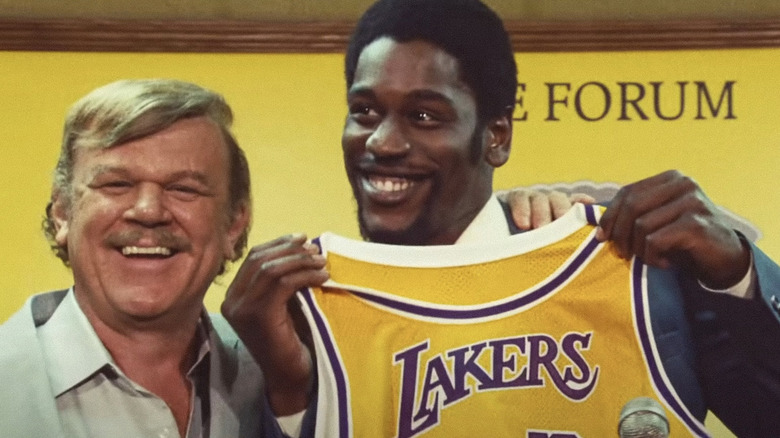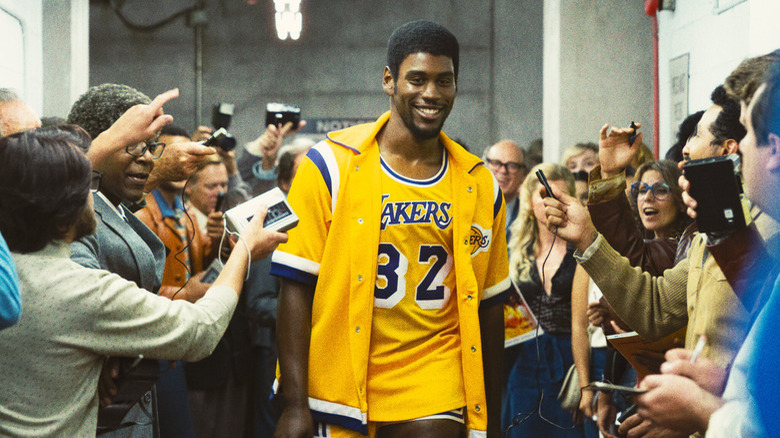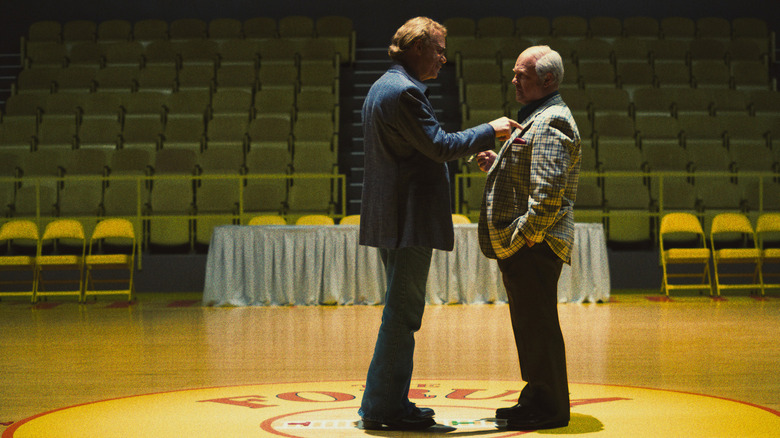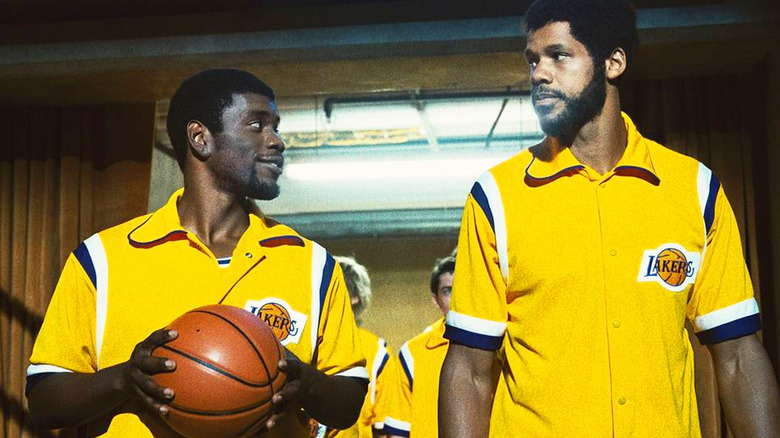Winning Time Showrunner Says The Complaints And Controversies Were 'Inevitable'
/Film's Ryan Scott is on the ground at Austin Film Festival, and today attended a panel centered on Max Borenstein, co-creator of the recently-canceled HBO series "Winning Time: The Rise of the Lakers Dynasty." The series, set in 1979-1980 and adapted from the nonfiction book "Showtime" by Jeff Pearlman, offers a behind-the-scenes look at the Los Angeles NBA team and its management during 1980 (when the team was home to legends like Magic Johnson and Kareem Abdul-Jabar).
While fans may be disappointed about the series being canceled after just two seasons, some of its subjects might feel vindicated. For example, former Lakers coach Jerry West (played by Jason Clarke in "Winning Time") threatened legal action against HBO for his portrayal. The network refused to budge or throw its creators under the bus, citing dramatic license, as "Winning Time" is a dramatization, and providing assurance that the writers had done their homework.
"'Winning Time' is not a documentary and has not been presented as such. However, the series and its depictions are based on extensive factual research and reliable sourcing."
Abdul-Jar published a criticism of the series on his Substack: "'Winning Time' Isn't Just Deliberately Dishonest, It's Drearily Dull." Abdul-Jabar specified that he wasn't offended by the series or his portrayal in it, but he found the writing lacking and the fictionalized portrayal of certain people insulting. Now that well over a year has passed since that initial wave of controversy, Borenstein was willing to comment in detail on the backlash.
'The point is to tell a story'
Borenstein says that the "Winning Time" team didn't forcefully respond to criticism at the time because they wanted to "take the high road." It seems that now that the show's over, he's willing to be more open. "I don't know if we should have [taken the high road] or not, to be honest," he says, in hindsight. "Because part of it was like, 'You're saying this didn't happen, and in your book you said that you did that.' And that was just a strange thing."
The showrunner said that "Winning Time" is unique in being an ongoing biographical series about still-living people, with "The Crown" (a show that has had its own share of complaints) being one of the few shows to take on a similar challenge. Borenstein felt that a dramatic license needed to go hand-in-hand with fealty to the truth, like any story:
"I don't think the point of telling any story is to tell facts about what happened. The point is to tell a story, and use it as a lens on something. You have a fealty to being accurate [...] But in every story you make choices before doing the dramatic version of it [...] there's a responsibility, but there's also a responsibility to why you're telling the story and what you're trying to say, and you have to have your own barometer."
Describing basketball as a "secular religion, people are that passionate about it," Borenstein wasn't surprised that some NBA devotees — both fans and Lakers' alums — had strong reactions to "Winning Time."
"[The show being about living celebrities] resulted in a few of the people, which was inevitable, complaining about 'I don't like the way I'm being portrayed.' The irony of that is that they both, the people who complained, both admitted they never watched it. And I know for a fact, from a lot of people who were there and a lot of people who we did portray, that said, 'Yeah, that's exactly — you got it.'"
Fact and fiction
One 1980s Lakers alum who was a fan of "Winning Time" was Spencer Haywood. His portrayal on the show by Wood Harris isn't flattering (because, true to reality, he was dealing with cocaine addiction and ultimately kicked off the team), but Haywood told the Seattle Times that he considers the dramatization a "blessing" — "People were like, 'I know you were crazy on that Lakers show, but let me look at your true story.'"
Jeanie Buss, the current owner of the Lakers (inherited from her father Jerry), is played by Hadley Robinson in "Winning Time." Buss expressed to The Hollywood Reporter, "They got a lot of stuff right and a lot of stuff wrong." More specifically, she praised John C. Reilly's portrayal of her father but said Clarke's Jerry West was not "the Jerry West that I remember growing up with."
Magic Johnson (who is the center of the show, played by Quincy Isaiah), ultimately agreed with Abdul-Jabar, though, who wrote in his aforementioned Substack post that he was disinterested in watching "Winning Time" because he lived the real version of the show's events. Unlike Abdul-Jabbar, who gave in and did watch the series, Johnson continued to ignore it. In the wake of the "Winning Time" cancellation, Johnson told the Hollywood Reporter that no retelling could match the reality of the 1980s Lakers: "None of us watched it because it was fictional. You just can't tell that story."
A second shot at Winning Time?
Can they not, though? At the end of the panel, Borenstein was asked if "Winning Time" could find a new home elsewhere. Pointing to other streaming service revivals, Borenstein took a "never say never" mindset.
"I think there's always a chance of things ... We'll see. There's nothing right now, but I mean, 'World War Frasier' is coming out. That's how I look at it. It's why I didn't really want the little last scene to put a button on it, because it was like, 'Nothing's ever over.' So we'll see, maybe one day there'll be an opportunity."
Granted, "Winning Time" does come with something of a shelf-time; it's telling a real-life story about a specific group of people at a specific point in history. Maybe it could continue following the path of "The Crown" and focus on different iterations of the Lakers moving forward in history. Like Borenstein said, "We'll see."
"Winning Time" is streaming on Max.



